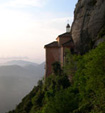"A visitor passes through a place, the place passes through the pilgrim."
- Cynthia Ozick
 "How unsatisfying are the observations of an art critic if one has not seen the painting or a guidebook before one has visited the place.... It is often forgotten that events take place in space as well as in time, and the events on which Christian faith is based happened not only at a particular time in history, but also at specific places. Where something happened is as significant as when it happened. There is no better way to fix an event or person in the mind than to visit the actual place where the event occurred or where the person lived. In a mysterious way, tangible things have the capacity to stir the inner eye, as though there exists a kind of mystic harmony between things of the spirit and objects of sense."
"How unsatisfying are the observations of an art critic if one has not seen the painting or a guidebook before one has visited the place.... It is often forgotten that events take place in space as well as in time, and the events on which Christian faith is based happened not only at a particular time in history, but also at specific places. Where something happened is as significant as when it happened. There is no better way to fix an event or person in the mind than to visit the actual place where the event occurred or where the person lived. In a mysterious way, tangible things have the capacity to stir the inner eye, as though there exists a kind of mystic harmony between things of the spirit and objects of sense."
-Robert Louis Wilken
Since 2003, the 17łÔąĎÍř has organized an annual summertime pilgrimage for its faculty to visit important sites in the life of St. Ignatius of Loyola, founder of the Jesuits. The pilgrimage is an opportunity for religiously diverse faculty to share a lived experience of early Jesuit history and Ignatian thought, which enriches their understanding and teaching of the College's Jesuit mission.
Through Northern Spain, the pilgrims trace Ignatius' footsteps, from Loyola Castle, the site of his birth and conversion, to the cave at Manresa where he dwelled for nearly a year, praying and practicing what would become his Spiritual Exercises. They visit the monastery at Montserrat, the birthplace of St. Francis Xavier and the Gothic Quarter of Barcelona. Then, they fly to Rome and visit the apartments of St. Ignatius, the GesĂą church and the church of St. Ignatius, and the sites of other early Jesuit ministries.
17łÔąĎÍř invites groups from other Jesuit colleges and universities to join us on pilgrimage. More than 100 faculty and key administrators have done so already, particularly from Xavier University, St. Louis University, Loyola University Maryland, and Loyola University Chicago. Arrangements for other institutions' participation are finalized by December of the year before the trip.
No matter their religious affiliation or scholarly background, the faculty and staff who have made the pilgrimage consistently report back that the pilgrimage was somehow personally transformative and provided new understanding of what Jesuit mission in higher education means today.
Thomas M. Landy, director of the McFarland Center for Religion, Ethics and Culture at 17łÔąĎÍř, organizes the pilgrimage annually.


























